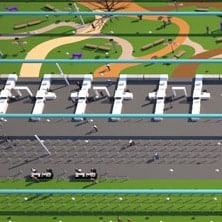
With more than 10,000 athletes staying at the village of 31 apartment blocks close to the Olympic Park during the Rio Olympic Games, there must be a fair amount of logistical problems for officials to face. Although the media doesn’t always hear about them, especially if everything goes to plan and there are no disasters, there will always be thousands of people working hard behind the scenes to make such a massive event possible.
This is something that AiQ Consulting has a lot of experience in! During the London 2012 Games, we worked with various contractors and clients to organise the Pop-Up terminal at Heathrow for the thousands of athletes arriving and departing London before and after the Games.
Organising check in facilities for the thousands of athletes leaving London in a two-day window after the Games had ended was the biggest concern. With 7,000 bags, 28 check in desks, thousands of athletes and a great many coaches transferring people from the Olympic Park, it was a mammoth task. Heathrow had to provide a seamless, efficient and stress-free experience for the athletes, while coping with an unprecedented high level of passenger and baggage demand.
To make this work more efficiently for everyone involved, we devised a new process that allowed athletes to check in beforehand at the village with their bags, rather than the usual few hours before at the airport. The athletes’ bags were then taken by lorry and screened and stored overnight at Heathrow before the athletes had even left the village.
However, this involved planning and predicting the number of coaches required for athletes, lorries for bags, timings for arrivals, and finding out how and where bags would be handled and stored safely, temporarily, until it was time for them to be placed on their relevant aircraft. The bags also had to be screened and passed through security.
Storing and screening bags in this way involved an unprecedented stakeholder integration exercise at Heathrow, involving every airline and ground handler. With a new process, the demand for storage, and the unusual method of screening, we also needed to undertake in-depth negotiation with the Department of Transport and their relevant counterparts overseas, as the bags were effectively crossing boarders unchecked.
Our unique simulation software, TransvisionAiR™ provided capacity planning and solutions throughout this challenging situation with our stakeholder capabilities engaging everyone involved. We, and the rest of the Olympic team, had the numbers we needed for bags, lorries and coaches, as well as the demand for storage and screening for bags, in order to make the process a relaxing and happy one for all those athletes travelling back.

